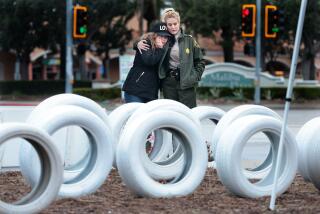Red Light Camera Ruling Reversed
- Share via
A judge reversed himself Thursday and announced he would no longer dismiss controversial red light tickets issued by cameras at seven West Hollywood intersections.
Los Angeles County Superior Court Commissioner Hugh Bobys said he had dismissed the tickets on the basis of his interpretation of a state rule governing the interval for a yellow light. West Hollywood, which benefits from some of the fines, contended that a 3-second yellow light is legally long enough.
“I am persuaded by ... the argument that 3.0 seconds is the minimum the Legislature intended as a floor that traffic engineers could not go below,” Bobys said.
Last week, Bobys ruled that cameras were snapping pictures one-tenth of a second too soon at the intersections of Beverly and Robertson boulevards; La Cienega and Sunset boulevards; Santa Monica Boulevard at Fairfax and La Brea avenues; and Fountain Avenue at Crescent Heights Boulevard, Fairfax and La Brea.
So he threw out nearly a dozen cases, which called into question thousands of the $271 tickets issued during the first 10 months of last year. The city issued 19,654 such citations in all of 2002.
At issue was a rule that, officials said, lengthened a 3.5-second yellow light interval to 3.6 seconds. It went into effect Jan. 1, 2002, but the city didn’t enforce it until October 2002.
But William Litvak, a lawyer for the city, argued that the ruling gave cities some discretion. Focusing on the word “suggested” in the California Department of Transportation traffic manual, Litvak said the 3.6-second figure is just that.
“You have to give the traffic engineer some wiggle room,” he said. Others said the Caltrans recommendations should be given priority, and those ticketed shouldn’t have to pay the fine.
“Public confidence in the photo red system has always been tenuous at best,” said Lee Rittenburg, a San Bernardino County lawyer who specializes in red light camera cases.
The only way to restore confidence, Rittenburg said, is to dismiss the cases in question and give those who have paid the $271 fine their money back.
Last month, a Los Angeles judge threw out more than 2,000 tickets when it was discovered that a red light camera at a busy East Los Angeles intersection was photographing drivers while the light was still yellow.
But West Hollywood officials say they have no intention of reviewing closed cases and refunding fines, which they estimate would cost about $4 million.
“We were not artificially setting the yellow phase low to increase violations to increase revenue,” Litvak told the judge.
But Talia Green, 27, will get her money back. Hers was one of the few cases dismissed before Thursday’s ruling.
The light “went from yellow to red so quick that I would’ve had to slam on my brakes to stop,” she said of a light change last year at the intersection of La Brea and Fountain avenues. “I probably would’ve gotten rear-ended.”
More to Read
Sign up for Essential California
The most important California stories and recommendations in your inbox every morning.
You may occasionally receive promotional content from the Los Angeles Times.










